[:de]Chiara Lubich: “Das Land des anderen wie das eigene lieben”[:fr]Chiara Lubich : “Aimer la patrie de l’autre comme la sienne”[:zh]盧嘉勒:「愛別人的國家如同自己的國家!」
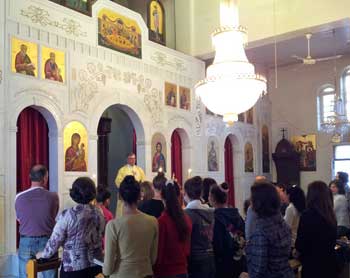
War in Syria: Is it still making news?

Intensifying our prayers for peace
At the general audience of March 1, 2015, Pope Francis remarked that “Dramatic stories continue to arrive from Syria and Iraq concerning violence, kidnappings and damaging harassment of Christians and other groups. We wish to assure all those who are caught in those situations that we have not forgotten them, but are near to them with our insistent prayers that the intolerable brutality of which they have been victim may soon come to a halt.” The vast crowd that filled St Peter’s Square paused for a moment of deep prayer, as it remembered the two tortured countries of the Middle East.
From Syria they write: “Many surrendered to the idea that the war is a fact of life and that the hundreds of people who die every day no longer make news. The people have reached the limit of endurance and the winter is long and cold, without diesel fuel, electricity and water. The mortar fire continues to sow death in the big cities, while battles continue on the peripheries and in villages. The economy is on the ground and many families are unemployed; and legal outlets from the country are nearly closed. One Syrian bishop said that our people are humiliated and have had their human dignity insulted.”
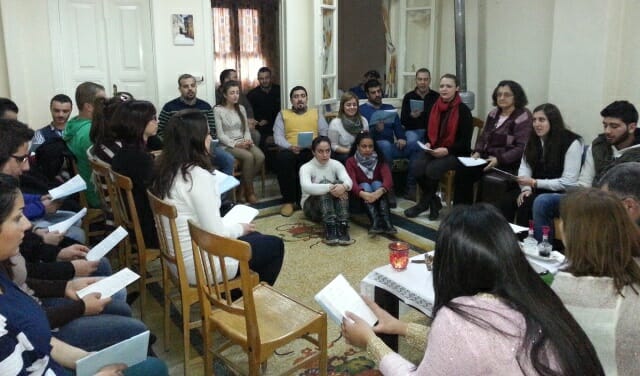 Despite the evil that is rampant in Syria, the local Focolare community continues to believe “that there can be a better future here. We continue to find strength in living the Gospel, even with courageous witness.” They know they are not alone but belong to a great family around the world that is continuing to pray for them and work for peace. “Although tiredness, after four years of war and the prospect of a dark future for the country weighs on us.”
Despite the evil that is rampant in Syria, the local Focolare community continues to believe “that there can be a better future here. We continue to find strength in living the Gospel, even with courageous witness.” They know they are not alone but belong to a great family around the world that is continuing to pray for them and work for peace. “Although tiredness, after four years of war and the prospect of a dark future for the country weighs on us.”
This was the Aleppo to which the members of the men’s focolare returned on February 23, 2015. They write: “After three months away, we’ve returned to set up our Focolare Centre in Aleppo, together with Sami our married focolarino who lives with his family on the coast. He comes to stay with us once a month. Staying here is a challenge, for we are aware that Jesus in our midst, through mutual love, is the only source of hope and comfort for the local community and the people around us.”
“During our journey,” they conclude, “we stopped for a week in Damascus, at the women’s focolare. They have supported the community in our absence. Then we spent a week in the community of Kfarbo in the middle of the country. There was a lot of joy over our return: now the family is complete! We are all very grateful for the prayers of so many people around the world who are supporting us in this hard trial.”
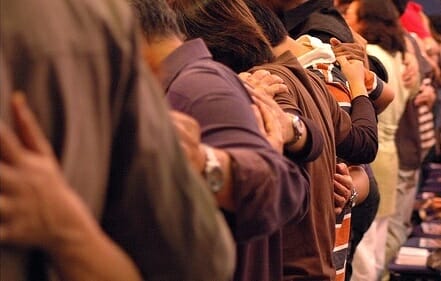
Living the Gospel:Taking the first step
“Our son, Matteo, was born with a serious respiratory problem, and we spent the first six months of his life in hospital. How can I describe the anguish we experienced during his respiratory crises, or when doctors were unable come up with the therapy that would meet his needs? Yet, we never doubted the Father’s love; thanks also to the support we received from our families and many friends. Overcoming the temptation of enclosing ourselves in our problem, we were enabled to share in the worries of others with children recovering in hospital, confronting the mystery of faith and suffering with them. Matteo is much better now. Recently, we were invited by the hospital department to belong to a group that reflects on issues related to young patients (the voice of the parents is important when it comes to difficult decisions). We accepted the invitation even though it would mean reliving our own pain, in the pain of others.”
M and S, Italy
The Cube of Love
“Mum and Dad don’t really get along. They often fight. Sometimes she doesn’t give in, and he becomes angry. To help them, even though I’m the smallest, the idea came to me of doing something at home that we do in school: learning how to love one another by rolling a cardboard cube with different phrases written on its six sides. I asked Mum and Dad to play it with me. We each had to take a piece of paper, copy down and do what they had read. If they didn’t do it, I would keep score of it in my score book. Mum got the side that said: “Love everyone,” and Dad got “Love your enemies.” By playing with me they had began to love one another again.”
D H, Philippines
An unexpected child
“Our daughter, Solange, a nurse at a clinic in Rio de Janeiro, was one day approached by a girl who was insisting on being admitted to hospital at least until she gave birth. She had neither documents nor money to pay for hospital care. Solange turned to the clinic director and other doctors, and finally the girl was admitted under the responsibility of my daughter. Everything went fine. A beautiful baby girl was born, Barbara. But a few days later, the girl disappeared leaving the newborn behind. The director and doctors got angry with Solange, to which my husband and I – even though we’re not so young anymore – offered to welcome Barbara as our fifth daughter, fifteen years after the birth of our youngest.”
A – Brazil

Loppiano: “Towards an economy for the common good”
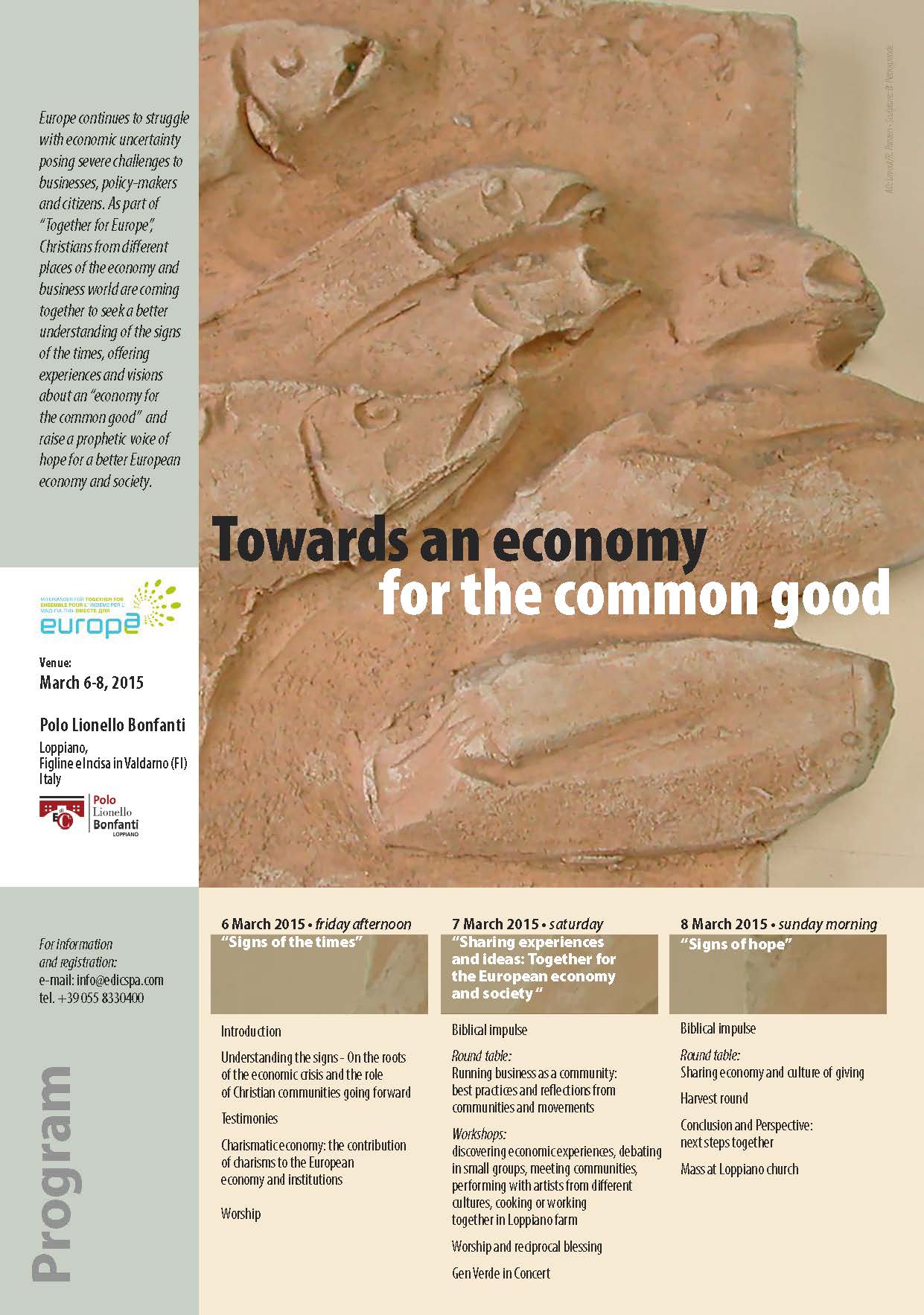 Europe continues to battle with economic uncertainty which is a real challenge for all enterprises, experts of economic policies and citizens. Christians from various economic fields and the entrepreneurial world will meet in Loppiano (close to Florence) from 6 to 8 March, to share their experiences and outlooks, so as to contribute to the diffusion of a prophetic message of hope.
Europe continues to battle with economic uncertainty which is a real challenge for all enterprises, experts of economic policies and citizens. Christians from various economic fields and the entrepreneurial world will meet in Loppiano (close to Florence) from 6 to 8 March, to share their experiences and outlooks, so as to contribute to the diffusion of a prophetic message of hope.
«Up to now, in Europe, only the institutions have stated their opinions – affirmed Prof. Luigino Bruni. Our dream is that in the ministries for economy, there may also be Franciscans, Focolarini and people who have chosen to stand by the side of the poorest of peoples… There is need for gratuitousness. Over the last ten years these voices have been silenced. An economy without a heart, without charisms that are able to include also the poor, is an economy without a future. What do all Christian movements have to say today, about the economic plan? At the start of the millennium we set out on our journey, “Together for Europe,” with Chiara Lubich. After 15 years of working together at the level of gaining knowledge, it seems that this journey has become a working together for a different kind of economy, a different type of politics. The time has come for us to voice out our opinions. »
The idea of a convention was conceived on November 2012 in Munich, Bavaria, during the Together for Europe meeting. On that occasion, economy experts of some movements and communities of different countries and churches, made an appointment to hold a session for in-depth reflection, with the aim of giving a specific contribution in the field of economy, starting off from their own charisms.
The programme provided for a moment of reflection on the “signs of the times” we are all witnessing, with the sharing of experiences. The moments of reflection on the “signs of hope” were shared in a round table on the economy of sharing and “culture of giving.” The programme also included an experimentation work lab «of manual and not only mental work,» at the “Loppiano Prima Farm,” and an artistic workshop with the Gen Verde music group. The convention, entitled “Towards an economy for the common good” will be laid out in three work groups regarding poverty, enterprises and institutions. An expo will be installed with the works produced by each community.
Not only banks, markets and finance will be involved – Bruni continues – but contributions from the lower sectors of society, starting from from solidarity, so as to allow the involvement of the poor and excluded people. We shall attempt to pursue this path with some Catholics and Evangelicals (John XXIII, Schönstatt, Focolare, Ymca and Vineyard) acting as the preparatory committee, and with the specific aim of allowing the charisms to voice their opinions on the economic crisis Europe is undergoing.». The idea, therefore, is to give a perspective to Europe starting from the economy of reciprocity and as a gift and not only in terms of interests and profits. It will be an economy which arises from cooperatives, and the social and civic sectors.
«Europe’s economy –Prof. Bruni explains – was also created by Saints Benedict, Dominic and Francis (if we considered the the institution of the Pawnshops), not to mention the social charisms that invented the schools, hospitals, simultaneously with the world of commerce which progressed with the enterprises and the merchants. The new Europe will arise from this crisis, and to achieve a good Europe, it still needs today, the contribution of the charisms, modern charisms that speak the language of economy: there is a wealth of life in the European Christian movements that still have something to say that differs from that of the European Central Bank. We shall start with modesty, but our objective is to go to Brussels to address the institutions with our specific contribution. »
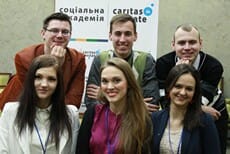
Ukraine: focus on Economy of Communion
 For a number of reasons it’s rather unusual for Ukrainian students to be mobile, to travel to other cities, to meet their fellows from other universities. Therefore, the winter school held in Sumy (Ukraine) from 2 to 7 February was a unique opportunity for the participants to meet and experience the cultural peculiarities of the different regions of Ukraine in a friendly environment of cooperation and mutual support. Because of this, the most important outcome of the winter school was that young people from all over Ukraine were able to meet and socialize, discuss their plans for the future, organize joint projects – and much more. Needless to say, such unity between young people of the East and the West of Ukraine is especially important in the current historical and extremely difficult times of crisis and civil war in the country. Even though after arriving in Sumy, the 42 participants declared that they were quite familiar with the topic of the winter school: “Values in Economy and Business”, by the end of the school all of them admitted that the contents of the lectures and workshops were actually all very new to them and that the illustrative examples given by the lectures provided them with a number of insights into the subject of corporate social responsibility. The school was hosted by the Ukrainian Academy of Banking, and kicked-off by its Associate Professor Petrushenko’s lecture on the ethics in business. His lecture sketched the main philosophical background of the ethics in business and introduced the major definitions of the subject matter of the social responsibility of businesses in society. The next presenter was Cristian Loza Adaui from the Friedrich-Alexander University Erlangen-Nuremberg (Germany) who gave an introduction to the Catholic social thought providing the basis for the EoC. His lecture was entitled: “The Business of Business is the Human Person” and initially it surprised and puzzled the participating students. Cristian Loza Adaui made a very deep theoretical introduction into another way of seeing business from a more humanistic and socially responsible and responsive perspective. He developed this topic further during the next day with a presentation that focused more on the practical application of the values in the context of social market economy. The presentation of Teresa Ganzon from the Philippines who shared her experience of running Bangko Kabajan, a rural financial institution based on the culture of giving and the Economy of Communion was also a new experience for the students who had never had a Skype lecture before and who admitted to be surprised by the very idea that banking could be based not only on the principles of profit maximization. In fact they could learn about a successful experience of running a financial institution that operates based on the respect for every customer as a person and taking into account his or her particular situation. Professor Tatiana Vasylieva talked about responsible social entrepreneurship in the Ukranian context, spending the entire fourth day together with the students. She invited in local representatives from banking and insurance business who spoke very openly and shared both their positive and negative experiences and presented their vision on how the main obstacles to a more socially responsible business in Ukraine could be overcome. Participating students found this lecture very interesting and engaged in a long discussion about the problems of contemporary Ukraine. Every day there were sessions of the winter school that were especially devoted to working on a number of small-group projects related to the subject of corporate social responsibility, ethics and values in business management. The representatives of the “Caritas in Veritate” Social Academy, the promoter of the school were there every day and joined in the discussions of the students’ ideas, helping them in their assigned tasks and in presenting their ideas to an external audience in an innovative manner. The last day of the winter school saw the presentations of the fruits of all the work done in groups. What turned out to be really interesting was the analysis of the controversial relationship between the traditional attitude towards the way business should be done in order to increase profits as much as possible and a social responsible entrepreneurship based on ethics and the values of the common good. All in all this winter school… was a great success.
For a number of reasons it’s rather unusual for Ukrainian students to be mobile, to travel to other cities, to meet their fellows from other universities. Therefore, the winter school held in Sumy (Ukraine) from 2 to 7 February was a unique opportunity for the participants to meet and experience the cultural peculiarities of the different regions of Ukraine in a friendly environment of cooperation and mutual support. Because of this, the most important outcome of the winter school was that young people from all over Ukraine were able to meet and socialize, discuss their plans for the future, organize joint projects – and much more. Needless to say, such unity between young people of the East and the West of Ukraine is especially important in the current historical and extremely difficult times of crisis and civil war in the country. Even though after arriving in Sumy, the 42 participants declared that they were quite familiar with the topic of the winter school: “Values in Economy and Business”, by the end of the school all of them admitted that the contents of the lectures and workshops were actually all very new to them and that the illustrative examples given by the lectures provided them with a number of insights into the subject of corporate social responsibility. The school was hosted by the Ukrainian Academy of Banking, and kicked-off by its Associate Professor Petrushenko’s lecture on the ethics in business. His lecture sketched the main philosophical background of the ethics in business and introduced the major definitions of the subject matter of the social responsibility of businesses in society. The next presenter was Cristian Loza Adaui from the Friedrich-Alexander University Erlangen-Nuremberg (Germany) who gave an introduction to the Catholic social thought providing the basis for the EoC. His lecture was entitled: “The Business of Business is the Human Person” and initially it surprised and puzzled the participating students. Cristian Loza Adaui made a very deep theoretical introduction into another way of seeing business from a more humanistic and socially responsible and responsive perspective. He developed this topic further during the next day with a presentation that focused more on the practical application of the values in the context of social market economy. The presentation of Teresa Ganzon from the Philippines who shared her experience of running Bangko Kabajan, a rural financial institution based on the culture of giving and the Economy of Communion was also a new experience for the students who had never had a Skype lecture before and who admitted to be surprised by the very idea that banking could be based not only on the principles of profit maximization. In fact they could learn about a successful experience of running a financial institution that operates based on the respect for every customer as a person and taking into account his or her particular situation. Professor Tatiana Vasylieva talked about responsible social entrepreneurship in the Ukranian context, spending the entire fourth day together with the students. She invited in local representatives from banking and insurance business who spoke very openly and shared both their positive and negative experiences and presented their vision on how the main obstacles to a more socially responsible business in Ukraine could be overcome. Participating students found this lecture very interesting and engaged in a long discussion about the problems of contemporary Ukraine. Every day there were sessions of the winter school that were especially devoted to working on a number of small-group projects related to the subject of corporate social responsibility, ethics and values in business management. The representatives of the “Caritas in Veritate” Social Academy, the promoter of the school were there every day and joined in the discussions of the students’ ideas, helping them in their assigned tasks and in presenting their ideas to an external audience in an innovative manner. The last day of the winter school saw the presentations of the fruits of all the work done in groups. What turned out to be really interesting was the analysis of the controversial relationship between the traditional attitude towards the way business should be done in order to increase profits as much as possible and a social responsible entrepreneurship based on ethics and the values of the common good. All in all this winter school… was a great success.
